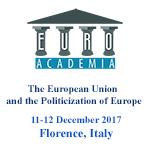Euroacademia Conferences
 Europe Inside-Out: Europe and Europeanness Exposed to Plural Observers (9th Edition) April 24 - 25, 2020
Europe Inside-Out: Europe and Europeanness Exposed to Plural Observers (9th Edition) April 24 - 25, 2020 Identities and Identifications: Politicized Uses of Collective Identities (9th Edition) June 12 - 13, 2020
Identities and Identifications: Politicized Uses of Collective Identities (9th Edition) June 12 - 13, 2020 8th Forum of Critical Studies: Asking Big Questions Again January 24 - 25, 2020
8th Forum of Critical Studies: Asking Big Questions Again January 24 - 25, 2020 Re-Inventing Eastern Europe (7th Edition) December 13 - 14, 2019
Re-Inventing Eastern Europe (7th Edition) December 13 - 14, 2019 The European Union and the Politicization of Europe (8th Edition) October 25 - 26, 2019
The European Union and the Politicization of Europe (8th Edition) October 25 - 26, 2019 Identities and Identifications: Politicized Uses of Collective Identities (8th Edition) June 28 - 29, 2019
Identities and Identifications: Politicized Uses of Collective Identities (8th Edition) June 28 - 29, 2019 The European Union and the Politicization of Europe (7th Edition) January 25 - 26, 2019
The European Union and the Politicization of Europe (7th Edition) January 25 - 26, 2019 7th Forum of Critical Studies: Asking Big Questions Again November 23 - 24, 2018
7th Forum of Critical Studies: Asking Big Questions Again November 23 - 24, 2018 Europe Inside-Out: Europe and Europeanness Exposed to Plural Observers (8th Edition) September 28 - 30, 2018
Europe Inside-Out: Europe and Europeanness Exposed to Plural Observers (8th Edition) September 28 - 30, 2018 Identities and Identifications: Politicized Uses of Collective Identities (7th Edition) June 14 - 15, 2018
Identities and Identifications: Politicized Uses of Collective Identities (7th Edition) June 14 - 15, 2018
A Critical Analysis of the EU-Turkey Deal on Irregular Migration: Is the EU a Successful ‘Norm Entrepreneur’?
-
-

-
Presentation speakers
- Beyza Ç. Tekin, Galatasaray University, Department of International Relations, Istanbul, Turkey
Abstract:
This paper studies the so-called EU – Turkey Deal, which was reached on 18 March 2016 as an attempt to provide an end to irregular migration from Turkey to Greece through the Aegean Sea. The aim of the presentation is to critically re-evaluate the EU’s international identity claims in the light of the readmission regime put into effect by the EU- Turkey Deal. The paper argues that the EU-Turkey deal on refugees has far-reaching implications for the EU’s international identity as the outcome of this initiative has a critical impact on whether the EU represents a successful ‘norm-entrepreneur’ whose actions are guided solely by normative considerations. The paper further argues that Europeanisation of migration and refugee policy significantly harms the EU’s normativity, and other international identity, claims. The article suggests that contrary to the expectations of those who promote the idea of a Cosmopolitan Europe, the EU’s common migration and asylum policy has turned into an effective tool for pressurizing neighbouring countries to adopt policies that may violate international refugee law.
-
Related Presentations

Germany's Ambivalent Policy Towards the Economic Problems of the Euro Area in the Light of Constructivist Theory
- Justyna Bokajlo

Vote for the Far-Right Parties in the 2014 European Elections
- Evgenia Eleni Mavropoulou

Paris as a Scenery of Rebelliousness During the Inter-War Period (1918-1933)
- Andrea Victoria Russo

The Europeanization of Balkans
- George Stavri
- Ljljana Jakovlevic

Euroscepticism in the Turkish Press
- Alaaddin F. Paksoy













